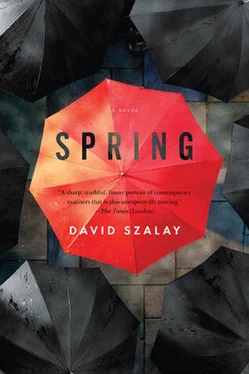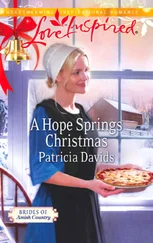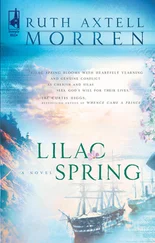The mare had lost, though for much of the way she had looked okay. Hard on the steel, she had taken it up half a mile from home. Then she flattened out on the turn, found nothing. Faded up the hill to finish a tired fourth. James only had a few quid on. There was a time when he might have staked everything on her. Now he just wanted to hold on to what he had. He had understood that on the train down to Sussex at lunchtime, when he was still wondering whether to lump on. When he decided not to—silently, staring out at flooded fields—he immediately experienced a flat feeling of peace.
He just stood there on the terrace for a while in the uncertain sunshine. ‘You were on then?’ Miller said. He seemed to misunderstand what James was feeling, to misinterpret the expression on his face. James nodded, and Miller started to produce various platitudes. Then he said, ‘Put her away for the summer now, and have another try in the autumn. Okay?’ James told him he was looking to sell, and made his way to the sleepy station at the far end of the track.
He phones Katherine as he walks through Mecklenburgh Square. When she does not answer, he feels a sharp pinch on his heart. They have not spoken since Wednesday. He tried her from the platform of Plumpton station—a tiny thing, lost in the Sussex landscape—while he waited for the London train. Now, when she still does not answer under the leafed planes of the square, the light-filled sadness of the spring evening pierces him—it is just so fucking sad, the way everything is moving on, starting something new.
To his surprise she phones him later. They talk for a long time. He tells her about the last meeting of the season at Plumpton, about how they have to sell the mare. He is lying on the sofa. The vent is open in the skylight.
‘What are you doing tonight?’ he says eventually.
‘Staying in, I think.’
‘You don’t want to meet up?’
‘No,’ she says.
‘How about tomorrow?’
‘I can’t tomorrow.’
‘Why not?’
‘I’m seeing someone else.’
‘Maybe in the week then, or next weekend?’
‘Maybe,’ she says.
She is in the National Gallery when he phones. She has looked at Piero della Francesca’s half-finished Nativity and tried, as usual, to put her finger on what it is about the picture that fascinates her. It seems to tease her. There is something wrong with it—the elements do not seem properly integrated—and yet it still fascinates her, still maintains the hold on her imagination that it has had since she was at school and there was a small, pale reproduction of it on the wall. Its modesty was what used to trouble her then, studying it while some teacher spoke—even the singing angels, such a modest little quintet. The whole scene one of hardscrabble poverty. Franciscan. It had disturbed her teenage sense of propriety.
Now she is standing, with a few other people, in front of the equally familiar image of The Arnolfini Portrait. It exerts a similar fascination to the Nativity. It too seems to have something wrong with it. The figures of the fifteenth-century financier and his wife medievally large, the space flat—except for the profound shadows of the mirror—and yet the plain light so true. The light from the window specifying the texture of their few small luxuries. The light was the same then… She answers her phone.
‘Hello?’
‘I’m okay,’ she says.
‘I’m not sure,’ she says a few moments later.
One of the blue-uniformed museum attendants, having left his seat and tiptoed up to her, whispers something.
‘Look,’ she says. ‘I have to go. I’m in the National Gallery and they’re telling me I can’t use my phone in here. I’ll call you back. Okay.’
She spends another minute looking at The Arnolfini Portrait. Strange, she thinks, this practice of looking at pictures, standing there ogling and hoping for some sort of effect—waiting for something like Auden’s ‘Musée des Beaux Arts’ perhaps to pop fully formed into your head. ‘About suffering they were never wrong, the Old Masters…’ Slowly she makes her way down the wide stairs and out of the museum into the sunlight of Trafalgar Square. Traffic, tourists, fountains, statues, sky. Four o’clock faintly audible—a fine wind pushing the fountains’ spray. She puts on her sunglasses. She was here last night, or not far from here. She and her mother saw The Marriage of Figaro, at the ENO. It is the sort of thing they do once a month—spend the afternoon shopping, then an early supper and the opera or the theatre or some hirsute intense Slav playing the piano in the Festival Hall. They parted on St Martin’s Lane at twenty to eleven.
Standing on the pavement in front of the Sainsbury Wing, she phones James. They had a tentative plan to see each other today. She is not sure she wants to. She would not have phoned him if he hadn’t phoned her first. In fact he says he has a hangover and suggests they meet tomorrow instead.
‘No,’ she says. ‘I have things to do tomorrow.’ And then, ‘I’m going to Greece on Monday.’
‘Greece?’
‘Yes,’ she says.
She has written a letter to her employer. She has not sent it yet—first she has taken the two weeks’ holiday they owe her, and she will spend those weeks in Greece, looking for somewhere, some idyllic shore, where she might open a small hotel. Then she will work her month’s notice while the people from Windlesham Fielding find tenants for Packington Street. There is plenty of equity in the property, and the loan forms are waiting on the table in the living room. Her father has promised to invest too, if she finds somewhere with potential. This she explains to James.
‘So…’ she says.
‘Well…’ He sounds shocked. ‘Let’s meet tonight then.’
For a second she says nothing. She wishes that he had not phoned her, that he had not put her, just when things were starting to seem simple, in this infuriating position of not knowing what she wants.
*
Last night, drunk, Freddy fessed up. He told James about his ten days in Paris—about that young American, that fantasy of freckled, milk-fed wholesomeness, with her spangled exiguous dresses and eight-inch heels, her thousand-watt smile in the plutocratic settings. The money from the touch all spent. Wondering whether the story furnished an example of utter foolishness or sublime wisdom—he was simultaneously envious and extremely pleased that he was not in Freddy’s position—James said, ‘What the fuck are you going to do now?’
And Freddy said—surprisingly—that he intended to go into posh primary schools and take photos of the pupils in their ties and haircuts and milk teeth, and then send watermarked samples to their parents, offering proper prints for a substantial fee. All he would have to do, he seemed to think, was persuade the school authorities that he was not a paedophile and he would be able to take thousands of pounds per school. ‘The point is,’ he said, smiling, ‘it’s a test of love, isn’t it. For the parents. They won’t want Toby to be the only kid in the playground whose parents don’t love him enough to get a photo of him. That’s why they have to be fucking expensive—if they’re not expensive enough it won’t work, it won’t be a proper test of love.’
Later, somewhere noisy and subterranean in Notting Hill, they found ‘Alan-friend’.
Fey and palely Oriental, Alan-friend stood on his own, occasionally snapping his fingers and shuffling his feet to the music. In the old days, he was there every night, and every night he was on his own, a strange figure of metropolitan loneliness. James and Freddy used to wonder who he was. The insane offspring of a Hong Kong trillionaire was a favoured explanation; the insanity having less to do with the senior naval officer’s uniform he was always wearing—though that was not particularly sane—and more to do with the fact that he spent every night in that one Notting Hill venue and never spoke to a single person there—and if you did speak to him he turned out to be a total fantasist, explaining with quiet seriousness that he was involved in the development of various spaceships and futuristic weapons systems and other top-secret science-fiction nonsense. So last night, for old time’s sake, they talked spaceships with Alan-friend for a while, and Freddy asked him if he wanted to invest in his new business, and Alan—in his vice-admiral’s uniform—said without hesitation, without even knowing what the business was, that he would be happy to, that he was always looking for ‘opportunities’. They agreed to meet and talk about it ‘seriously’ at some point in the near future.
Читать дальше












